Содержание
- 2. Institute of Managerial Personnel, Chair of Foreign Languages
- 3. Literature: Л.М. Лещёва English Vocabulary and a Guide to Its Learning. Мн.: Акад.упр. при Президенте Рб.
- 4. Academy of Public Administration under the Aegis of the President of the Republic of Belarus Institute
- 5. acquisition of a mother/native language/tongue (LI) the Imitation Hypothesis the Innateness Hypothesis the Critical Age Hypothesis
- 6. Institute of Managerial Personnel, Chair of Foreign Languages
- 7. Institute of Managerial Personnel, Chair of Foreign Languages
- 8. Principles of teaching an adult a foreign language The process of teaching a foreign language for
- 9. Institute of Managerial Personnel, Chair of Foreign Languages
- 10. Institute of Managerial Personnel, Chair of Foreign Languages
- 12. Summary Adults learn foreign languages in a different way than children do (1. they learn a
- 14. All living beings categorize, i.e., classify information into categories with prototypes as their core. Human beings
- 15. Factors contributing to cross-language vocabulary differences: NB! 1. Language communities choose different concepts for naming examples
- 16. Factors contributing to cross-language vocabulary differences: NB! 2. The boundaries of categories and their prototypes are
- 17. 2. UNIVERSAL WAYS OF NAMING
- 18. 2. UNIVERSAL WAYS OF NAMING meerkat [Origin: early 18th cent.: from South African Dutch, from Dutch,
- 19. суриката
- 20. 2. UNIVERSAL WAYS OF NAMING
- 21. 2. UNIVERSAL WAYS OF NAMING
- 22. 2. UNIVERSAL WAYS OF NAMING
- 24. Factors contributing to cross-language vocabulary differences 3. Differences in the way of naming foot – подножие;
- 25. 3. Motivation and Demotivation of Names Motivation: The form and meaning of one name may give
- 26. The relation of a name in meaning and / or form to another more simple name
- 28. Demotivation: blackboard, cupboard; cranberry; breakfast; pocket; hamlet book [Old English bōc ; related to Old Norse
- 29. Motivation and Demotivation of Names Folk motivation: copper ‘policeman’ from cop ‘arrest, catch’ [fr,L capere] not
- 30. Factors contributing to cross-language vocabulary differences 4. Motivation (public administrator vs. специалист в области государственного управления;
- 31. Institute of Managerial Personnel, Chair of Foreign Languages
- 33. Institute of Managerial Personnel, Chair of Foreign Languages
- 34. Map Gallia Tribes Towns
- 35. Institute of Managerial Personnel, Chair of Foreign Languages Celtic Peoples
- 36. Celtic dagger found in Britain.
- 37. Nude Celt warrior
- 38. The Dying Gaul, a Roman marble copy of a Hellenistic, a Roman marble copy of a
- 39. Institute of Managerial Personnel, Chair of Foreign Languages
- 40. Roman Empire
- 41. Institute of Managerial Personnel, Chair of Foreign Languages Roman Roads in Britain
- 42. Hadrians Wall
- 43. Boudica (d. AD 60 or 61)
- 44. The end of the Roman rule An appeal for help by the British communities against the
- 45. Vortigern
- 47. Saxon Expansion
- 48. Saxon Expansion
- 49. King Arthur led the defence of Britain against Saxon invaders in the early 6th century.
- 50. Saxon Expansion
- 56. The Danish invasion (8th-11th centuries)
- 59. Danelaw
- 61. DOMINIONS OF CNUT
- 62. Old Norse Words both, call, die, egg, fellow, flat, fog, gap, get, give, happy, happen, husband,
- 63. King Edward the Confessor, died on on 5 January 1066.
- 65. William I (the Conqueror) Hastings 1066
- 66. Possessions of William I
- 68. . French borrowings government, social and military order: parliament, government, baron, noble, servant, messenger, royal, state,
- 71. About 85% of the Anglo-Saxon words are no longer in use. About 50,000 Anglo-Saxon words still
- 74. 500 etymological doublets canal [L] — channel [Fr], liquor [L] — liqueur [Fr], major [L] —
- 75. ‘a translator’s false friends’ sympathy is not симпатия romance is not романс solid is not солидный
- 78. Lexical-semantic naming is a secondary use of the word for naming a related category. Lexical-semantic naming
- 79. The associations based on similarity (сходство) are called metaphoric: face of a person and face of
- 80. The sources for lexical-semantic naming, or for metaphor and metonymy are the most well-known: Objects: body
- 81. Lexical-semantic naming in English is used to give: in nouns: figurative (usually derogatory) names mainly to
- 85. SO: Сorrelated names may have: a) different semantic boundaries (blue – голубой, синий); b) a different
- 86. THE WORDS: Environment, government, public, policy (-ies), bureaucracy (-ies), collaborate, legal, resist, security, execute, promote, abuse,
- 87. Homonymy bay I ‘a deep howl or growl’ [from Old French abaiier ‘to bark’, of imitative
- 88. Classification of homonyms perfect homonyms: bank I ‘shore’ [Sc.] and bank II ‘financial institution’ [It]; homophones:
- 89. Classification of homonyms lexical homonyms: seal (n) ‘a sea animal’; seal (n) ‘design on a piece
- 90. Tongue twisters Of all the saws I ever saw, I never saw a saw saw like
- 100. under-: underling over-: overestimate, overwhelm out-: outstretch for-: foresee fore-: foreman un-: unaware, unable, unpredictable, unassembled,
- 101. ab-:abuse, abusive, dis-: discharge, dismiss, discretionary de-: decentralization e-: evaluate en-: encourage ex-: exclude, expire, in/l/m/r-:
- 103. Classification of suffixes derivational, or word-building (glorify) /non-derivational, or stem-building incredible) native (-er, -ful, -less, -like,
- 104. -ant: participant, -age: patronage, -acy: bureaucracy, autocracy, -ance/-ence; experience, co circumstance, convergence, dependence, competence, performance, -ary/ory:
- 109. V as N: search, reward, blame, need, lack, abuse, neglect, lead, rule, treat, recruit, affect, merit,
- 112. The second base is semantically more important, cf.: ring finger and finger-ring piano-player and player piano
- 114. Translate: телефон-автомат концлагерь руководство смехотворный благотворительность студент-второкурсник паровоз
- 115. Explain the difference in your translation: телефон-автомат – 1) (аппарат) public telephone 2) (будка) telephone box,
- 116. Translate: role-type, policy-making, street-level, guideline, background, framework, desktop administrator
- 117. Explain the difficulties in translation: role-type policy-making street-level guideline background framework desktop administrator тип выполняемой роли
- 119. b) Acronymy Abbreviation (Initislism): SMSA, SMT SMS for ‘short messages service’, DVD for ‘digital video disk’,
- 121. 4. The extension of proper names champagne, kleenex, coffee, nicotine, magnolia, sandwich, hooligan 5. Analogical word-formation
- 124. Word Groups in Taxonomies
- 125. Word Groups as Clichés and Set-expressions Clichés kind to people, wrong number, commit a suicide ladies
- 126. Word Groups as Idioms to break the ice to breath one’s last Hobson’s choice In cold
- 127. Multi-word Latin and French set expressions alter ego ‘second self’; id est (i.e.)‘ that is’; vice
- 131. Free Collocations украшать салат/… … отличное настроение/… … любимая девушка/… … poor student/… … advanced student/…
- 132. Summary: General characteristics of the English vocabulary Native words make up about 30% of the vocabulary
- 134. Some lexical factors that complicate comprehension, remembering, and retrieving words in Public Administration texts: The English
- 135. What’s in a name? часы (час in Russian means ‘time’) clock [Middle Dutch fr L ‘bell’]
- 136. What’s in a name? Russ. опенок from пень English: ? опенок осенний -- honey agaric (agaric
- 137. shake your hands!
- 138. Пожмите руку друг другу!
- 139. A name and the lexicon a bicycle unicycle, monocycle, tricycle, quadrocycle, motorcycle, to cycle, to bicycle,
- 140. ехать на велосипеде/ машине ride a bicycle / drive a car ride meant ‘to sit and
- 141. ‘the front of the head from the forehead to the lower jaw’; face ‘the upper marked
- 142. A name and the lexicon (conclusion) Different in character, names weave finally a unique lexical canvas
- 143. Lecture 7. Building a Better Vocabulary Plan The individual vocabulary. Major strategies in learning English vocabulary.
- 145. Active/passive vocabulary: Even the child having a normal use vocabulary of 1,000 words would “know” 10,000.
- 147. Different types of the word relations: Letter relations (apple, apricot) Phonetic relations (fanatic – phonetic; bank
- 166. Learning vocabulary is learning each individual word. Learning a word is learning a wealth of specific
- 168. III. Dictionaries of English (1) Latin and French Glossaries
- 181. Learning vocabulary is learning: - each individual word (sound/ graphic/ grammar/ form; translation; exact meaning; usage);
- 184. Скачать презентацию








































































![500 etymological doublets canal [L] — channel [Fr], liquor [L] — liqueur](/_ipx/f_webp&q_80&fit_contain&s_1440x1080/imagesDir/jpg/375054/slide-73.jpg)










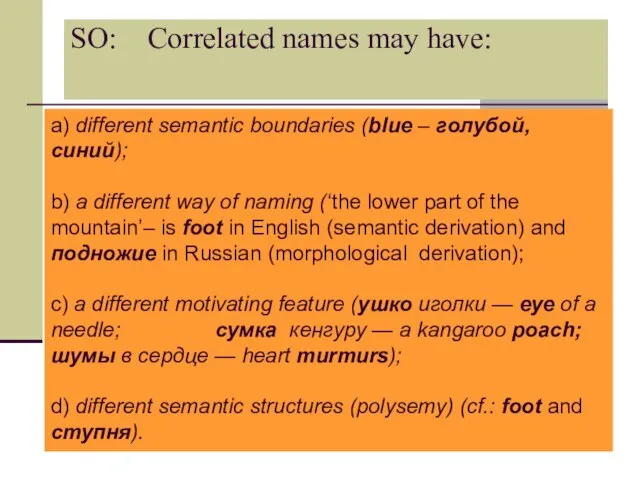

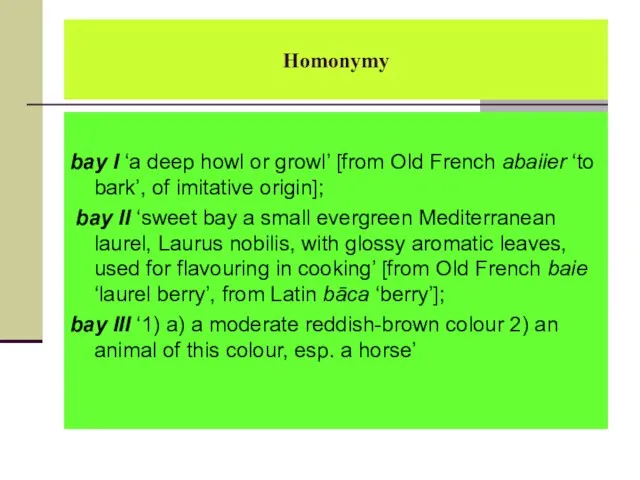
![Classification of homonyms perfect homonyms: bank I ‘shore’ [Sc.] and bank II](/_ipx/f_webp&q_80&fit_contain&s_1440x1080/imagesDir/jpg/375054/slide-87.jpg)
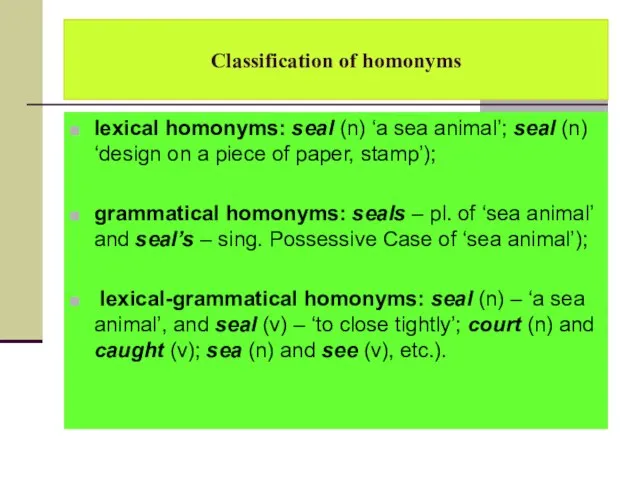
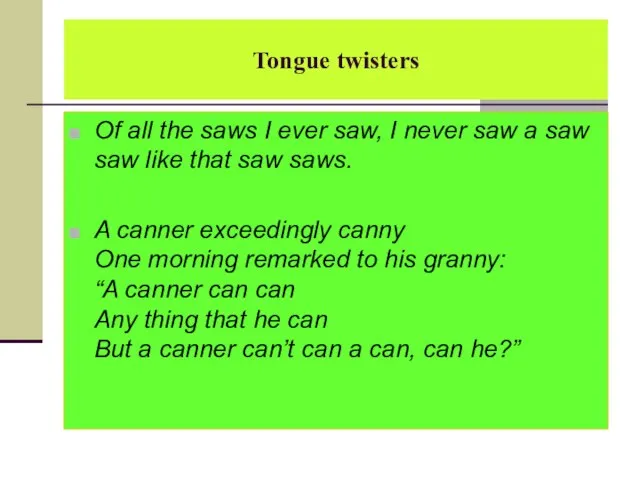
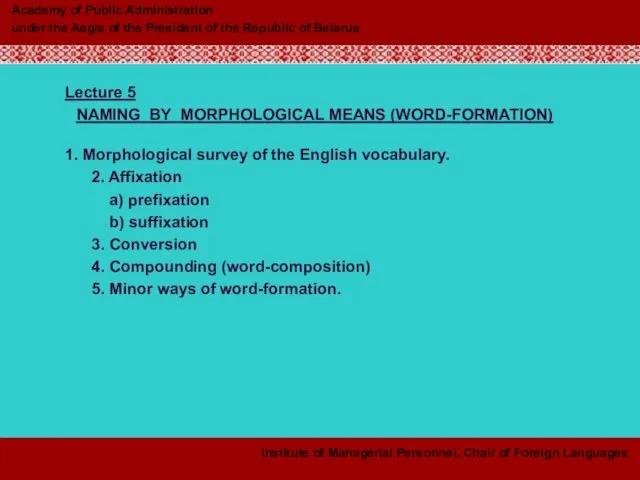

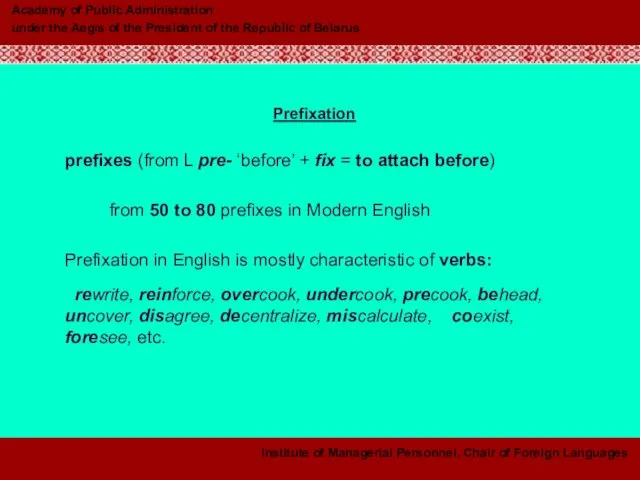

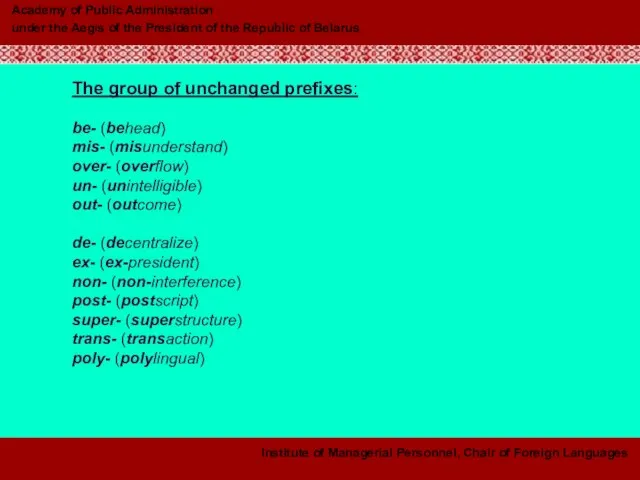
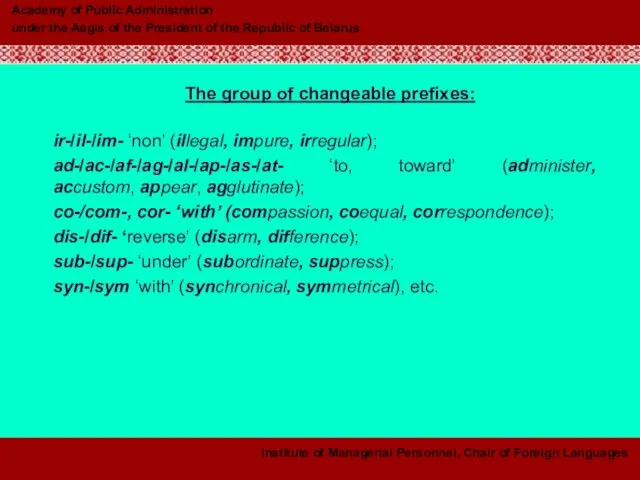
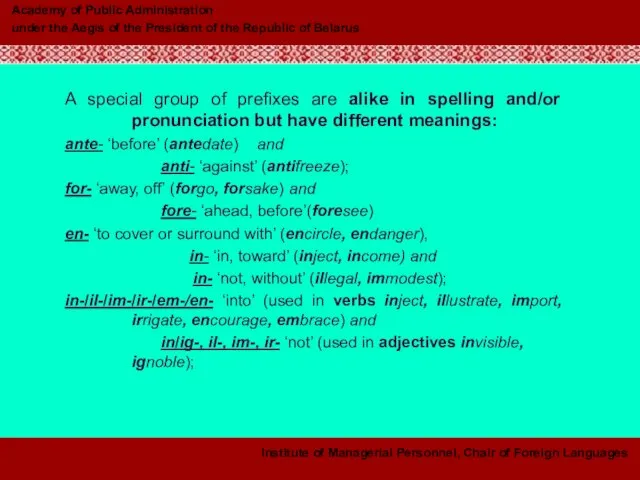
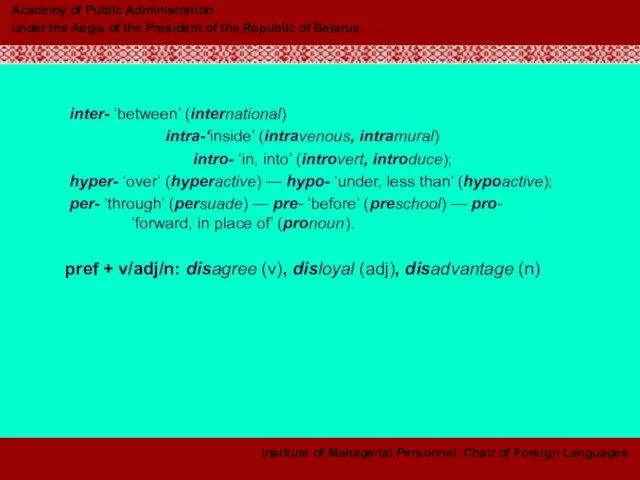
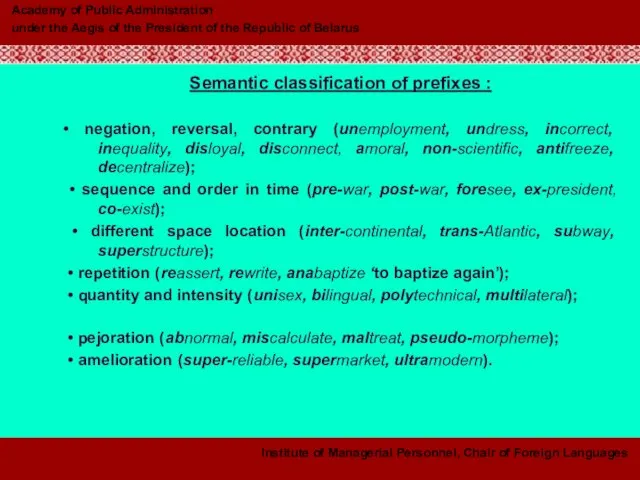
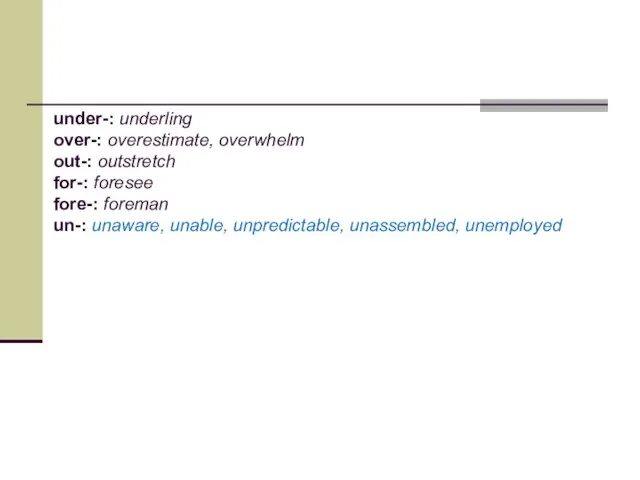
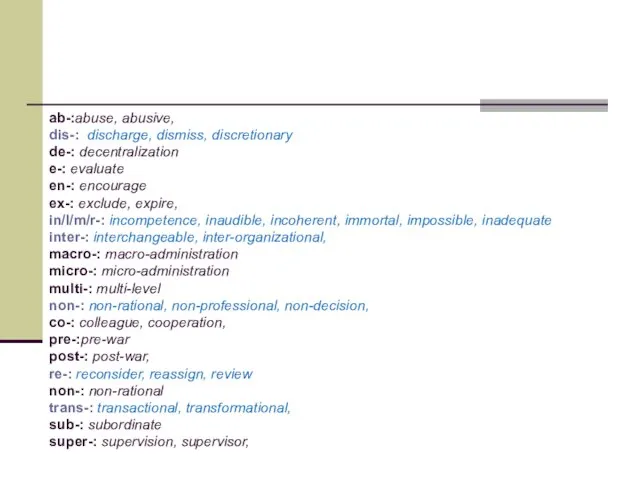

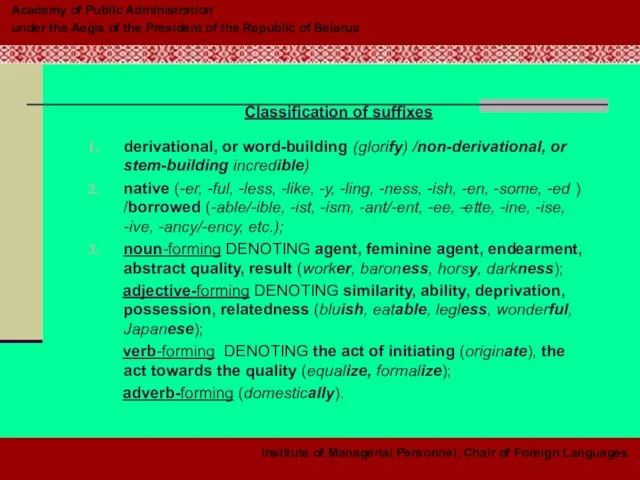
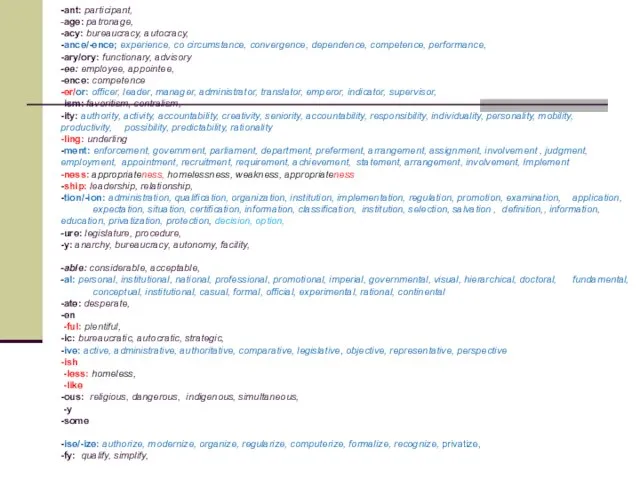
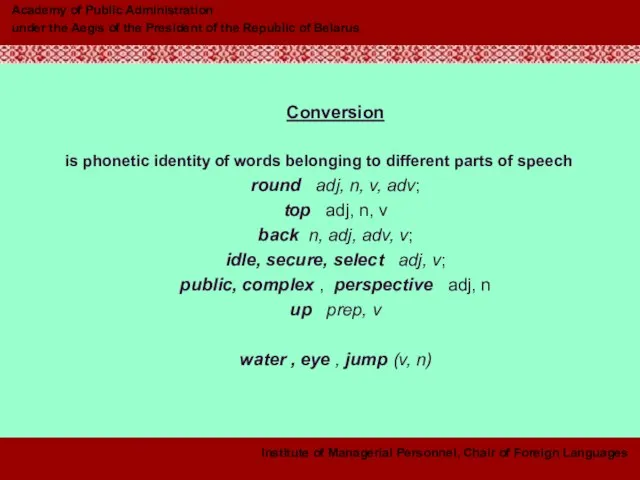
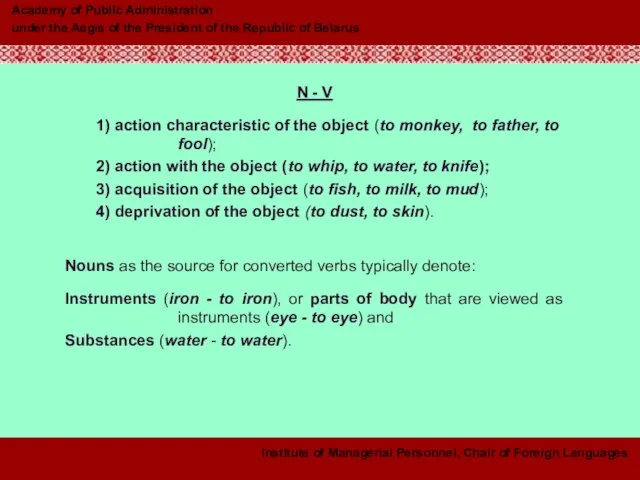
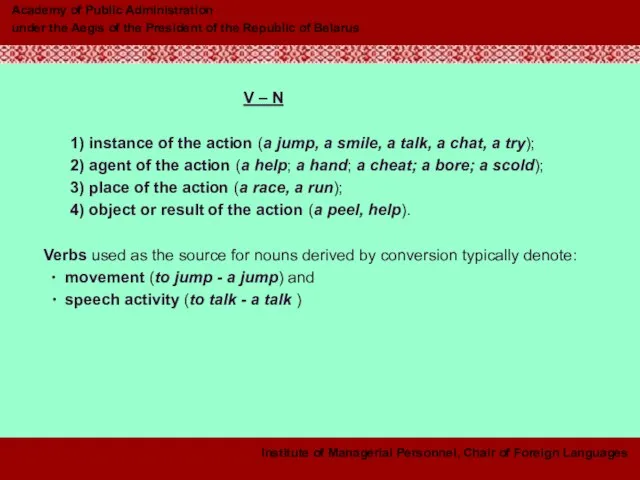
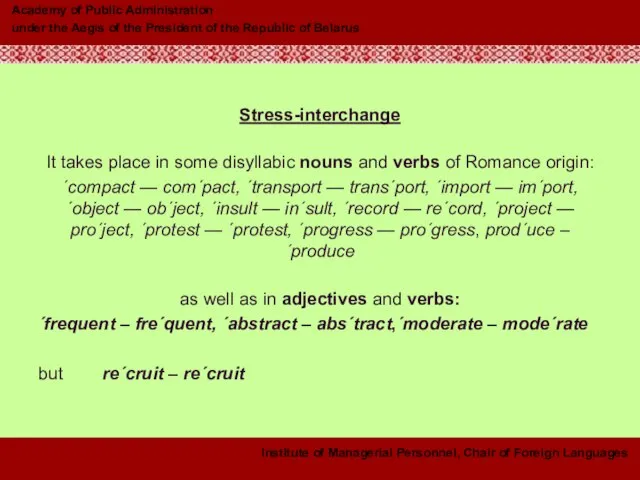
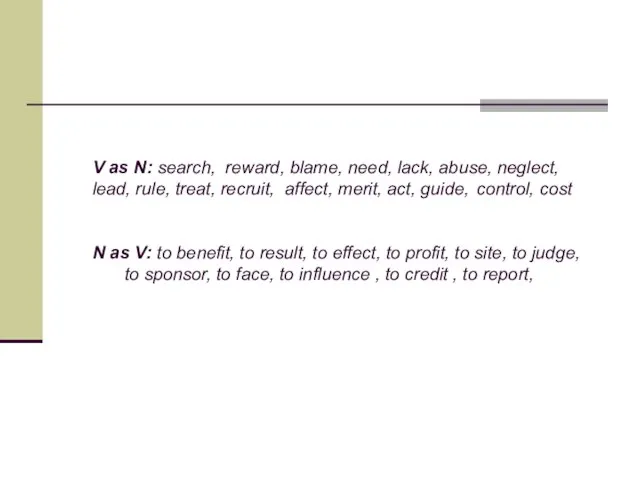
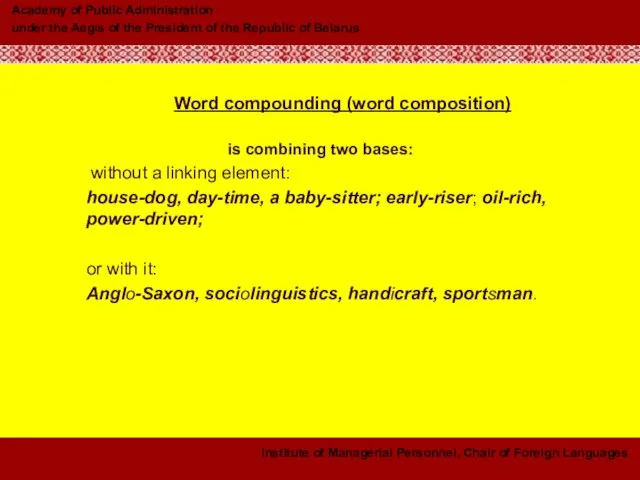
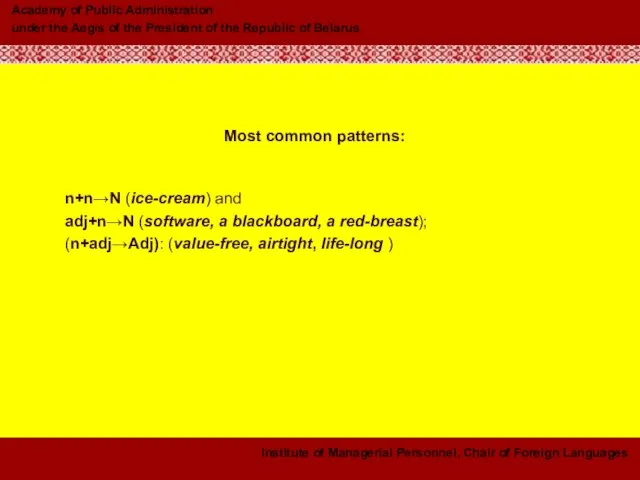
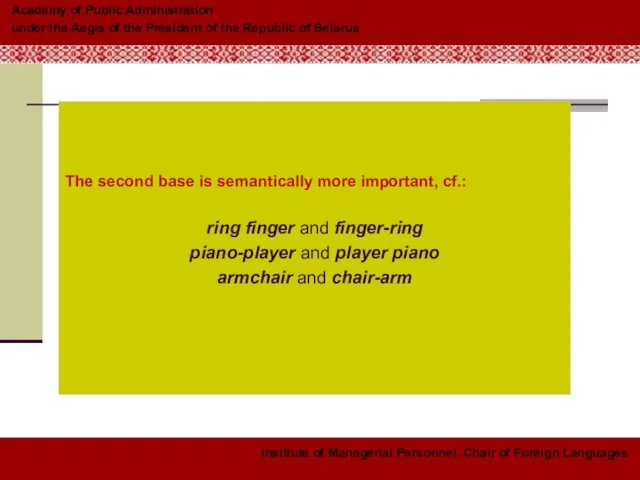
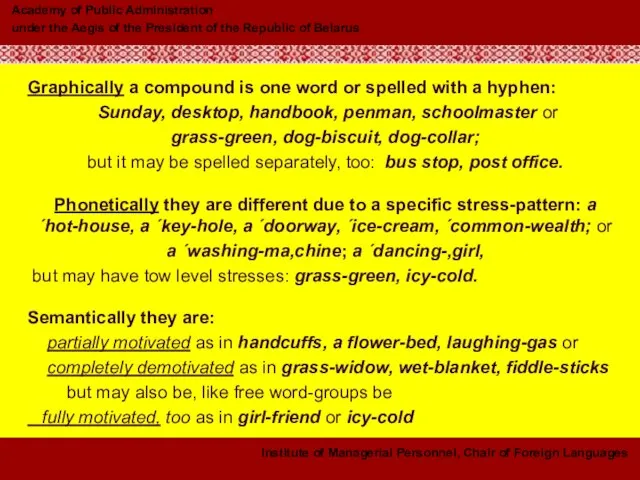
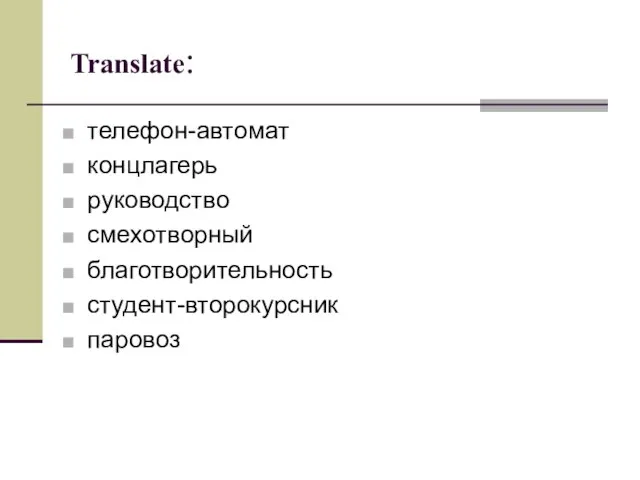
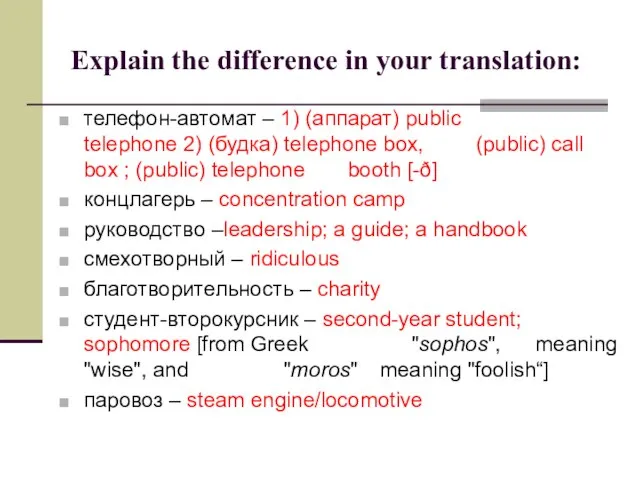
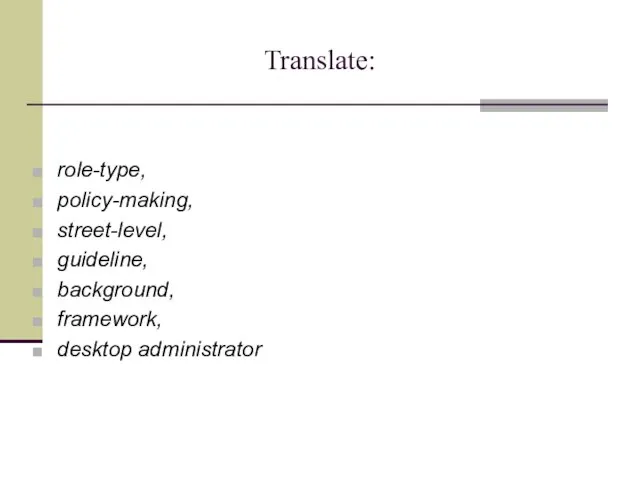
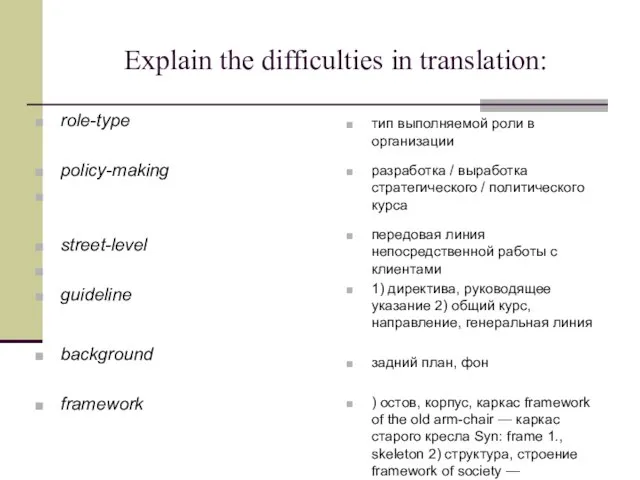
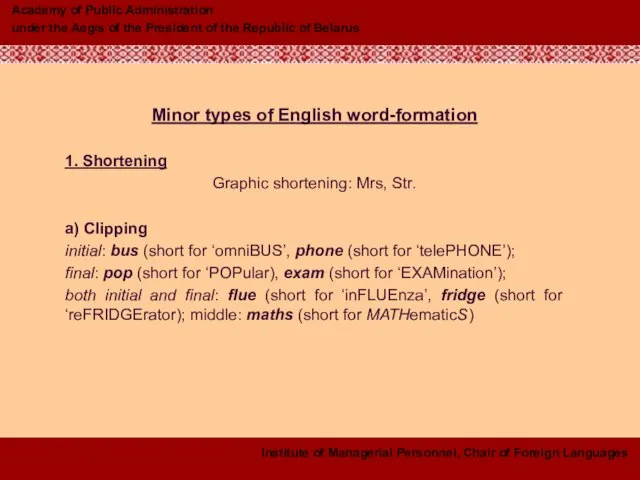
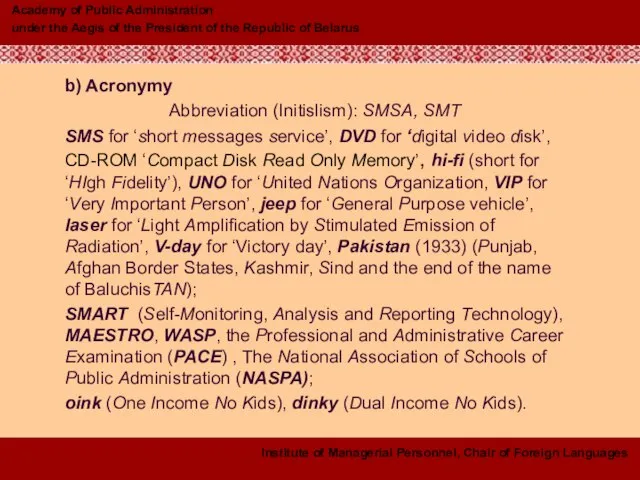
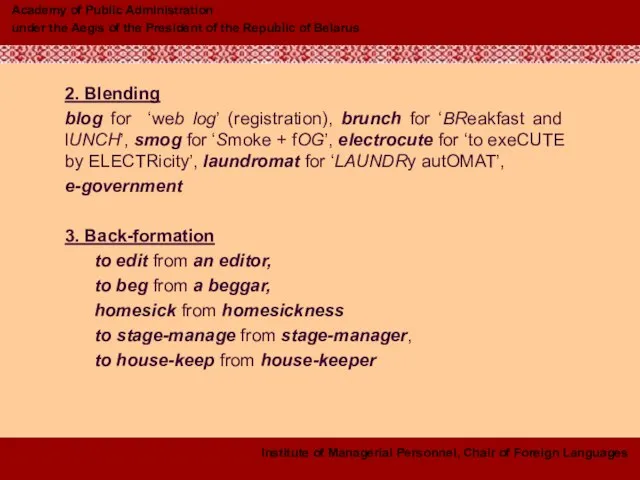
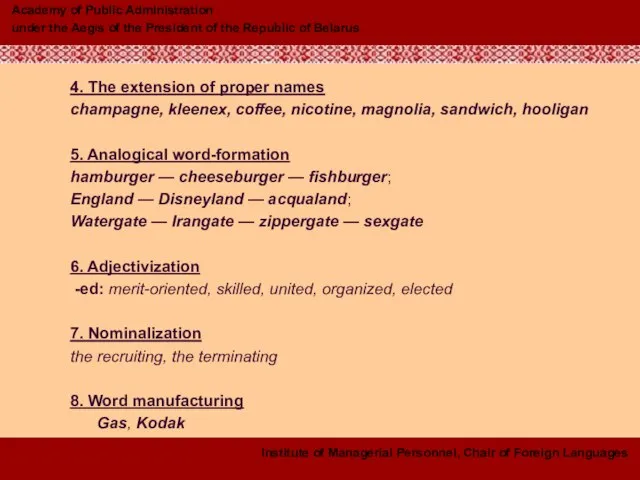
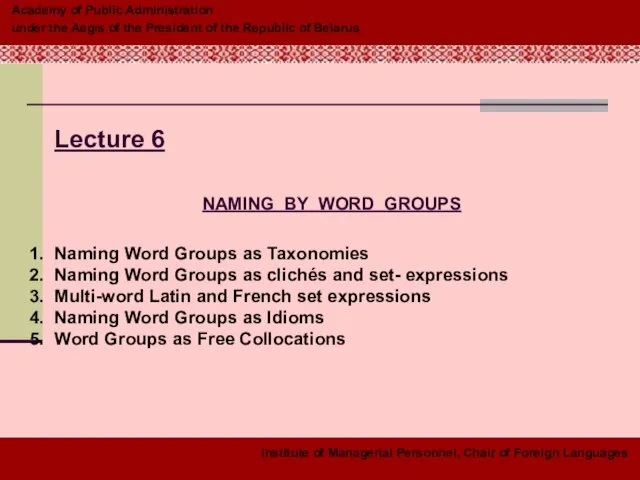
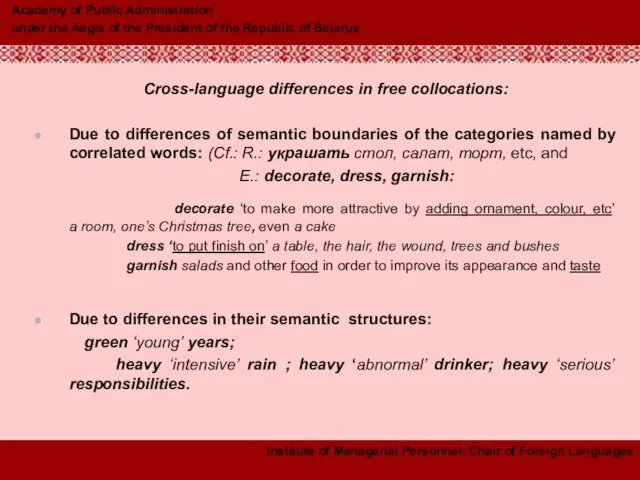
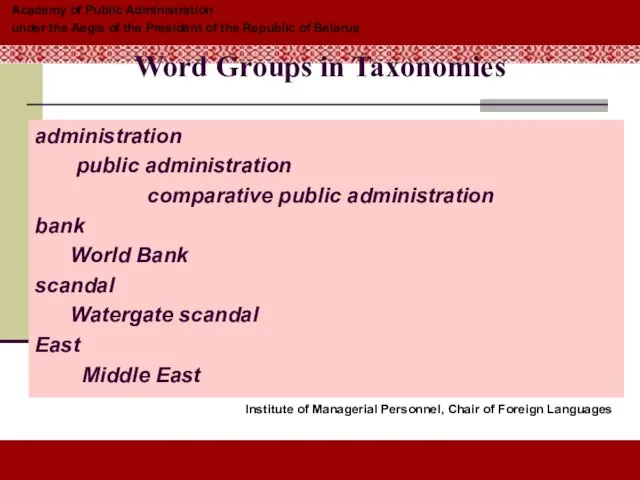
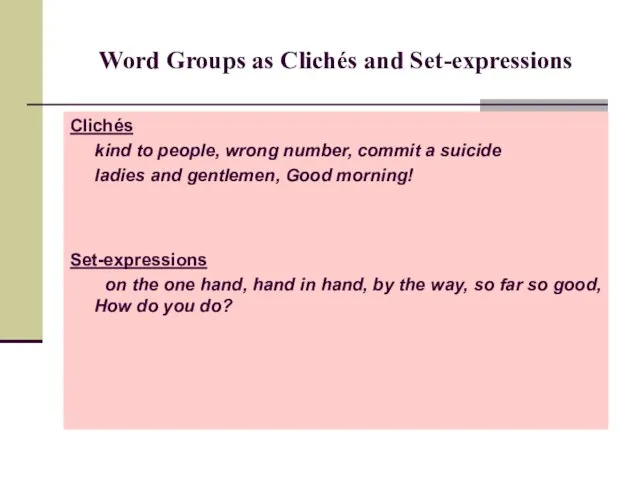
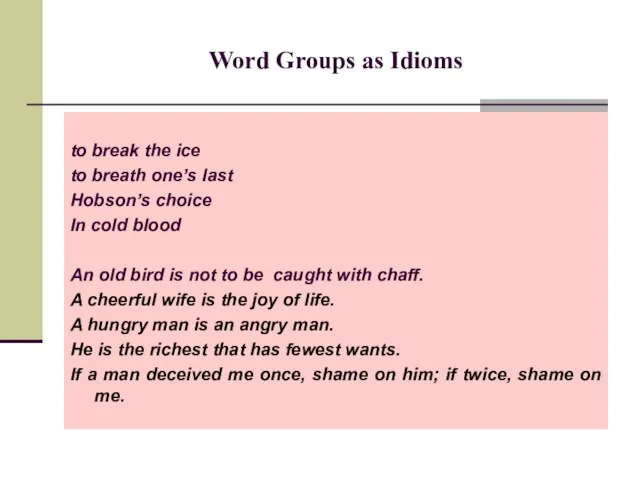
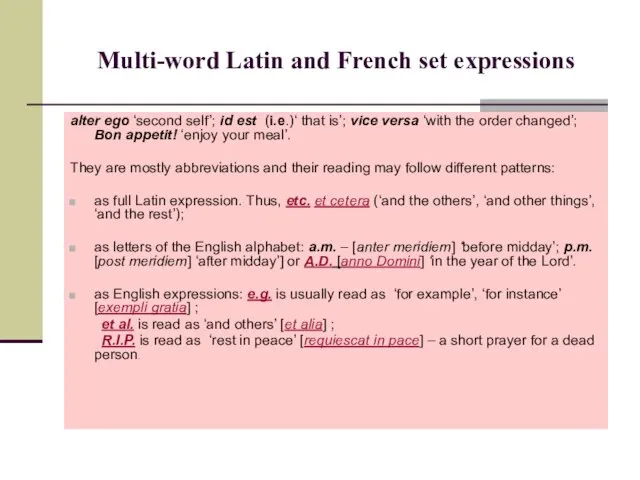
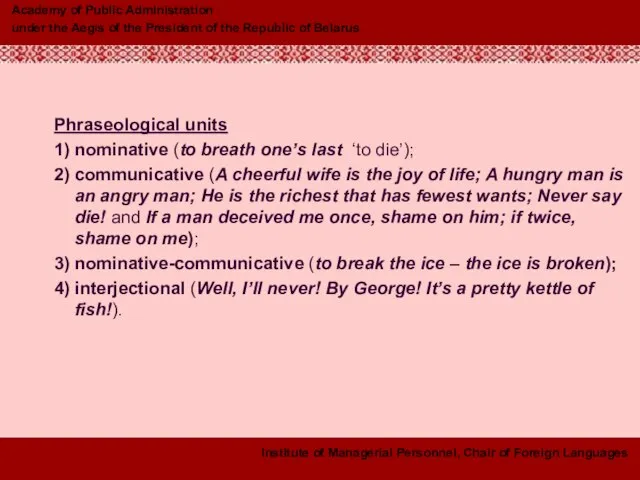
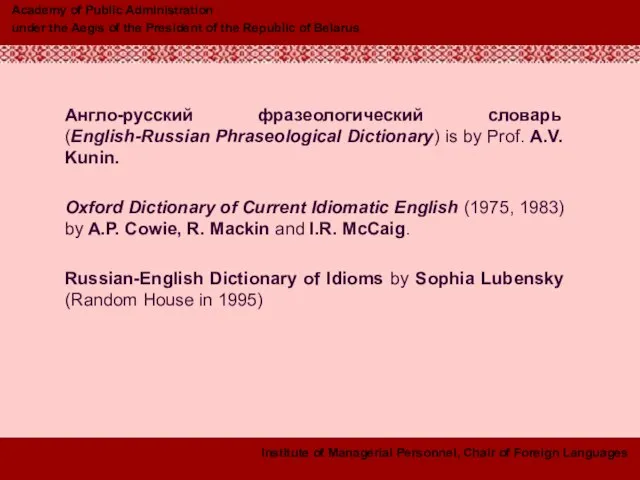
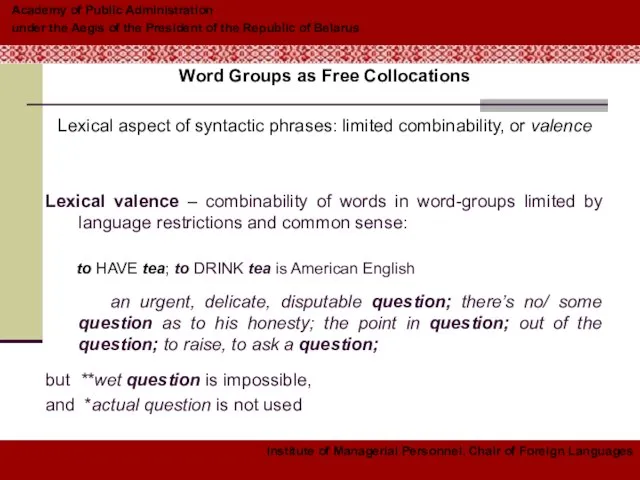
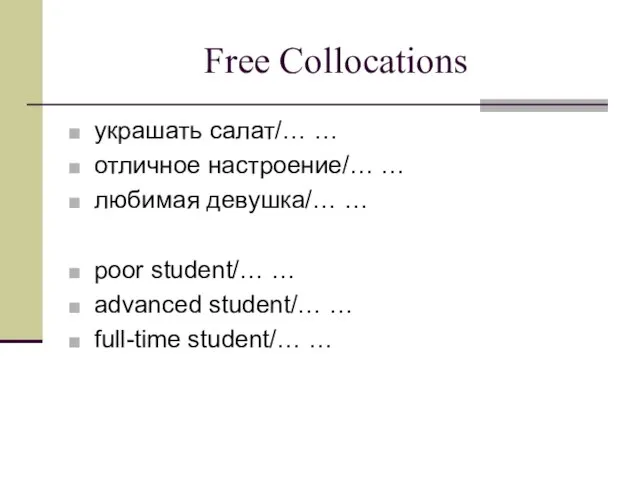
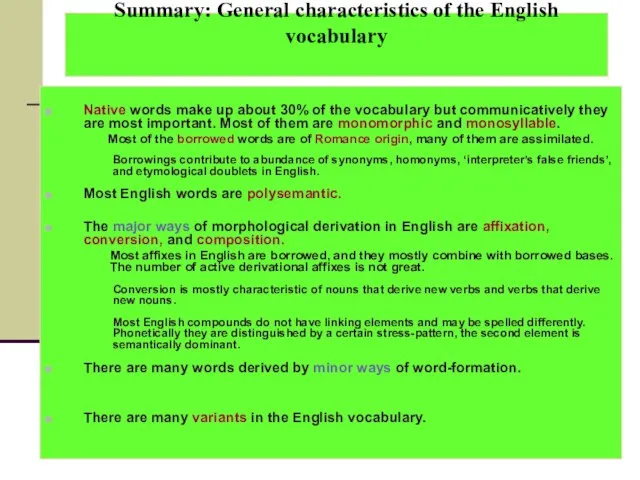
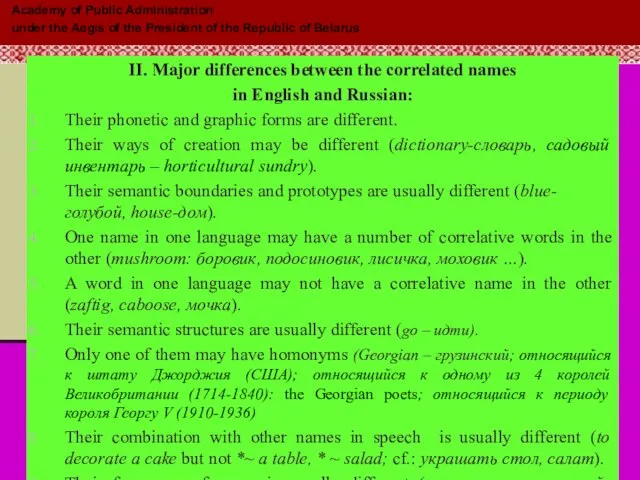
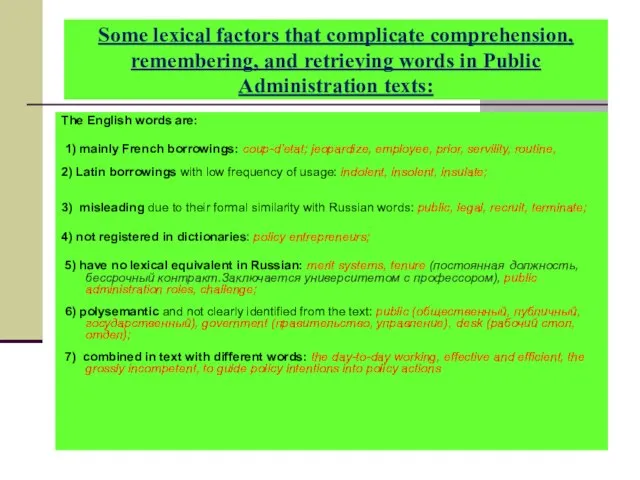
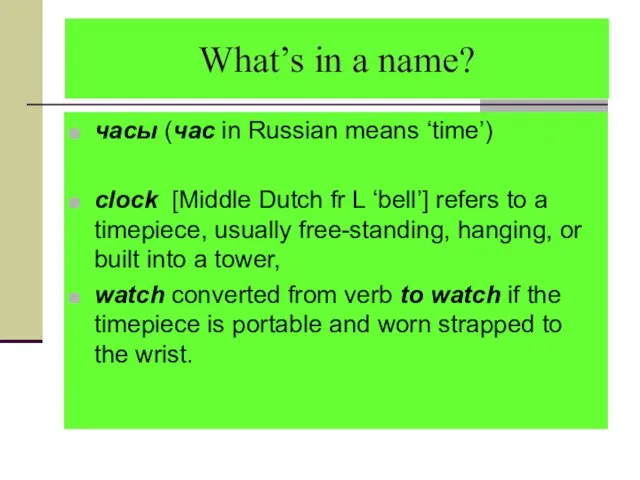
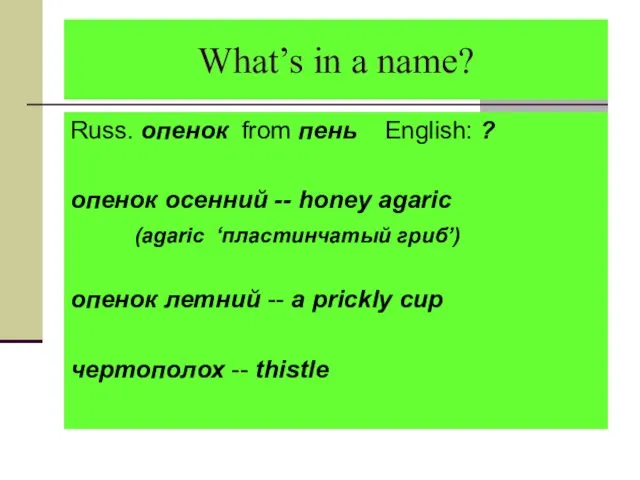
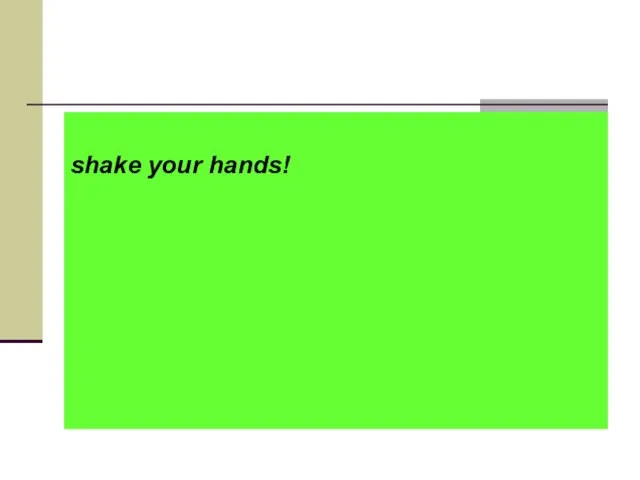

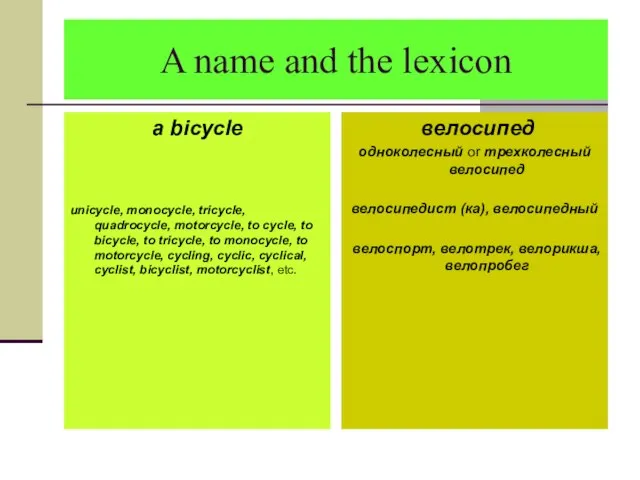
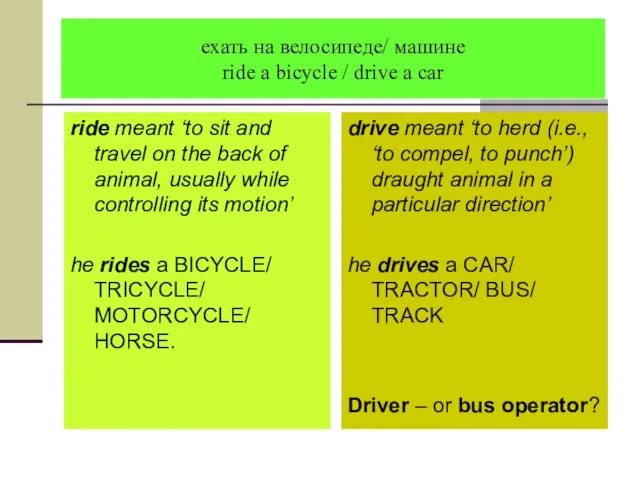
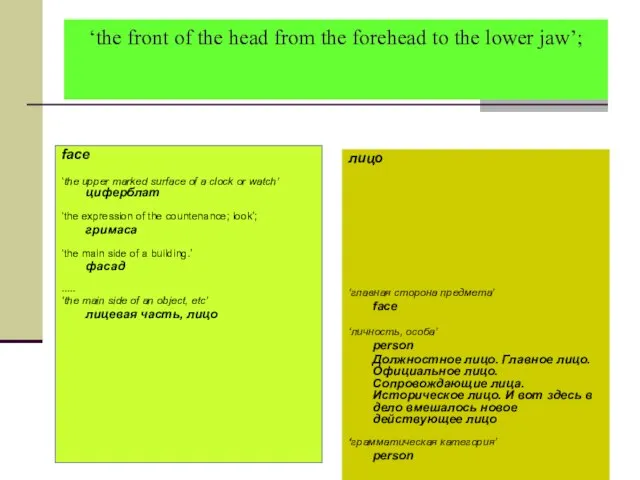
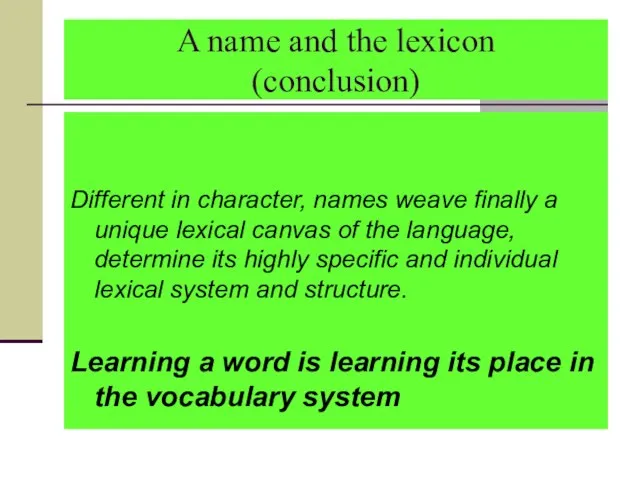
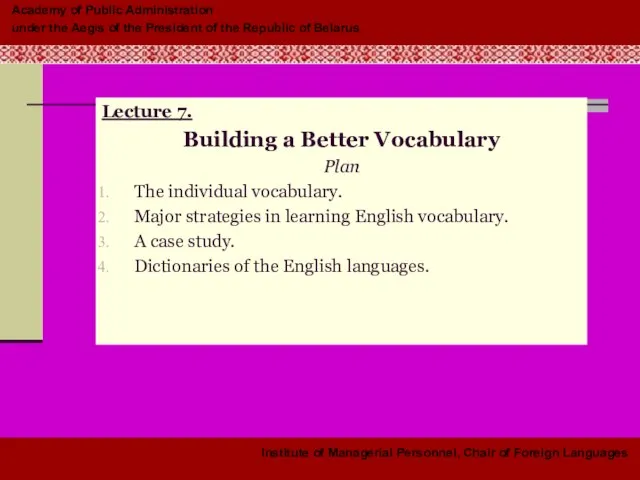
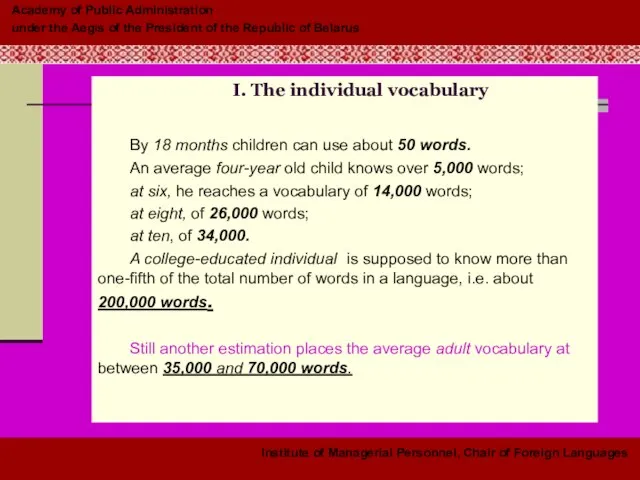
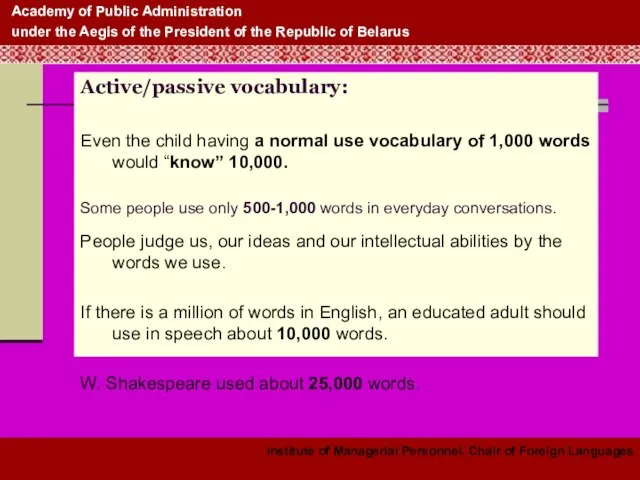
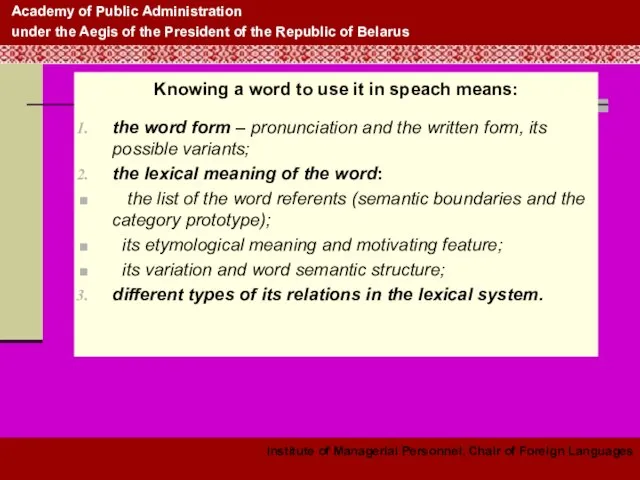
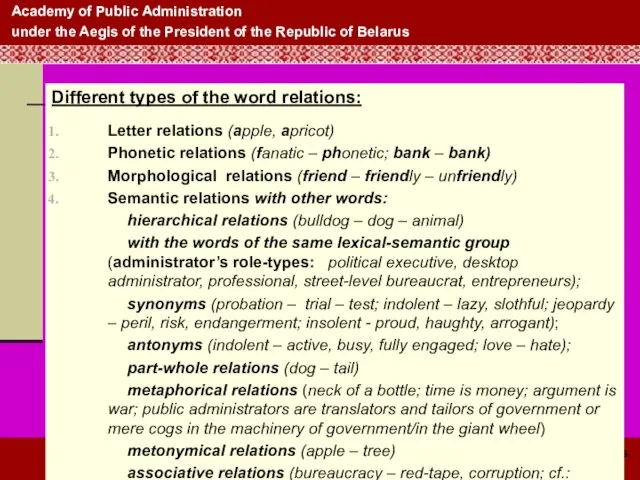
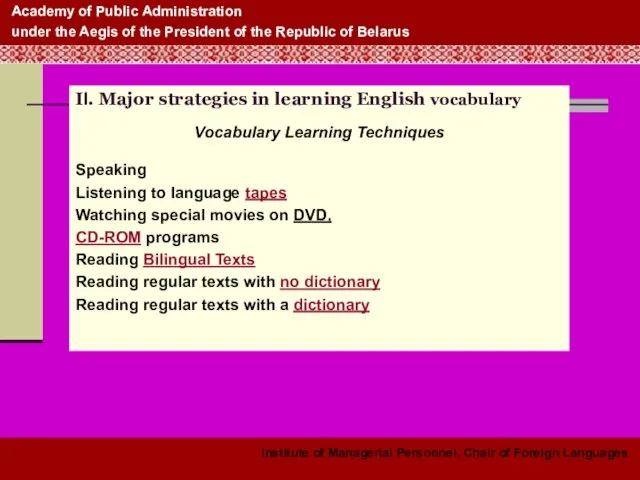
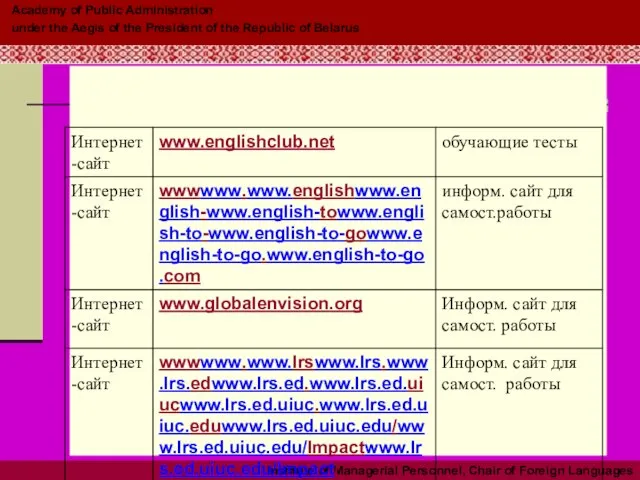


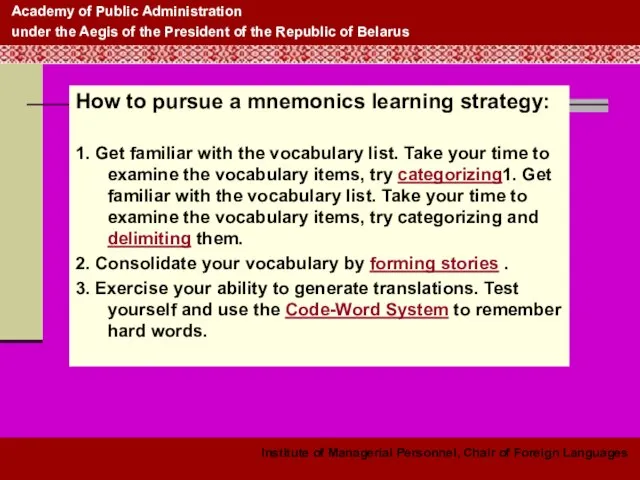
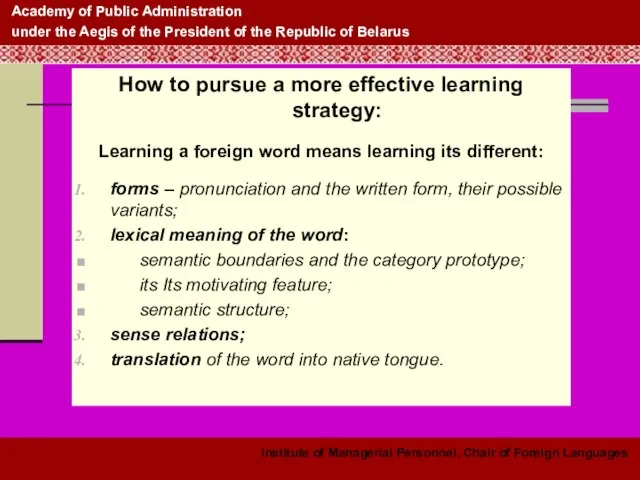
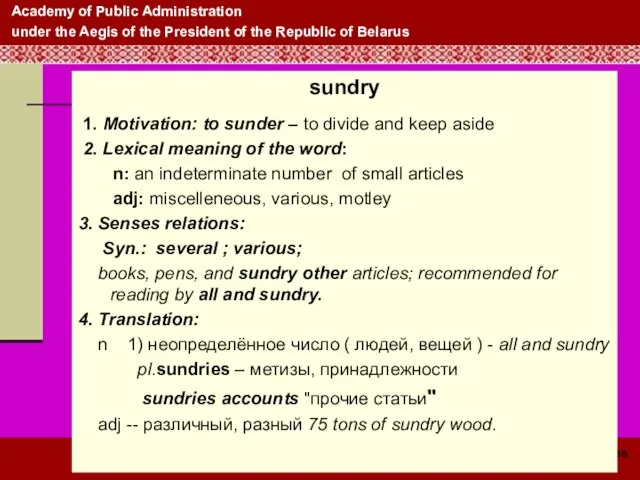
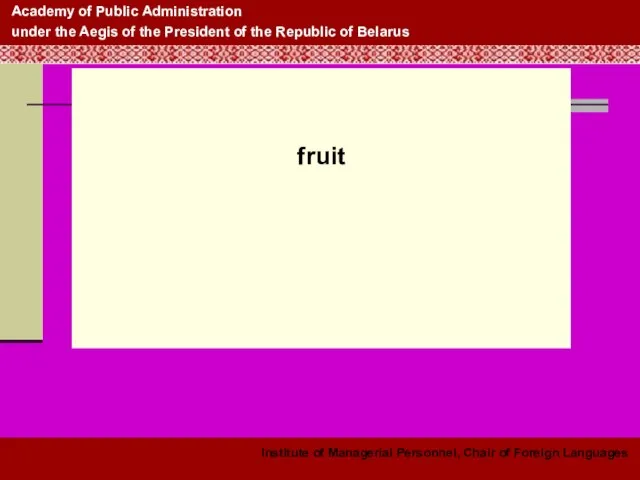
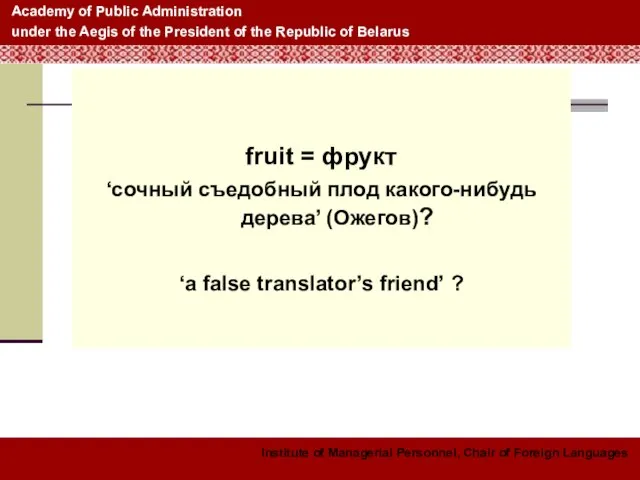
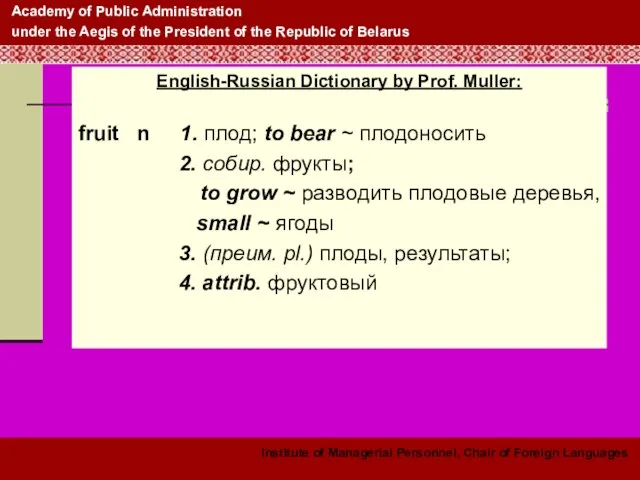
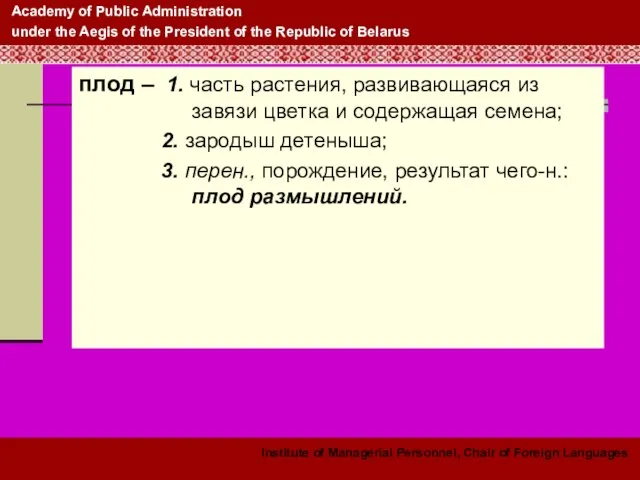
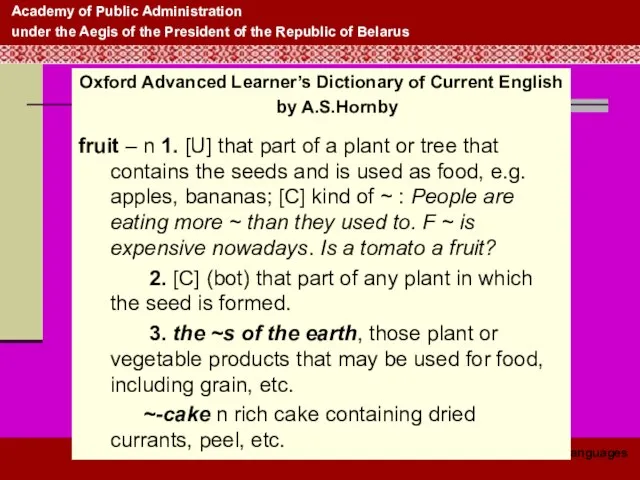


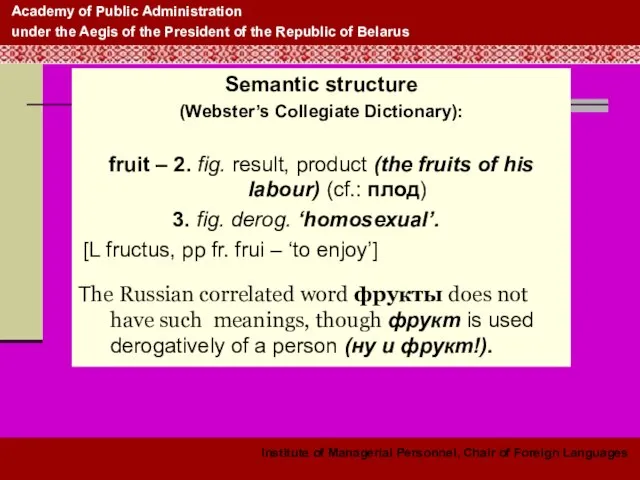
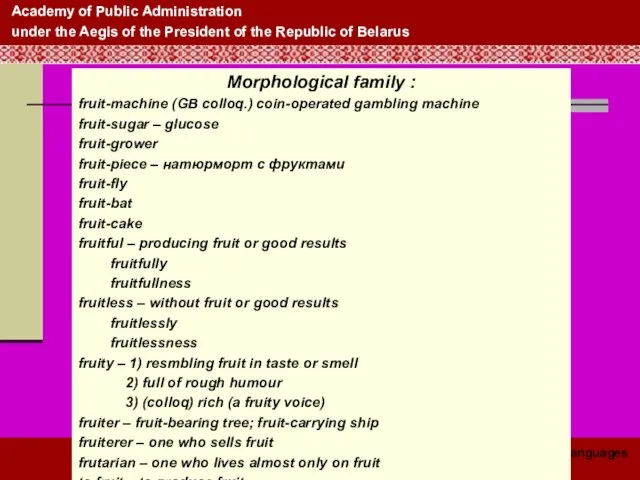
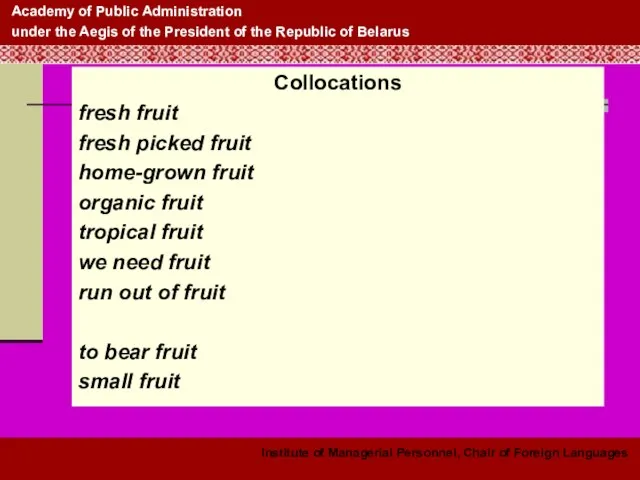
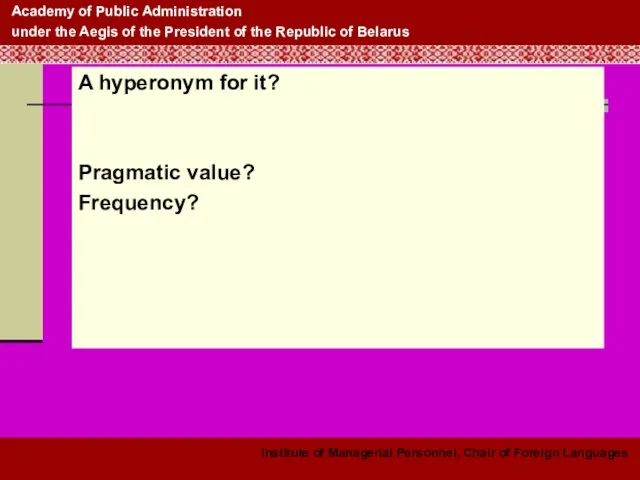
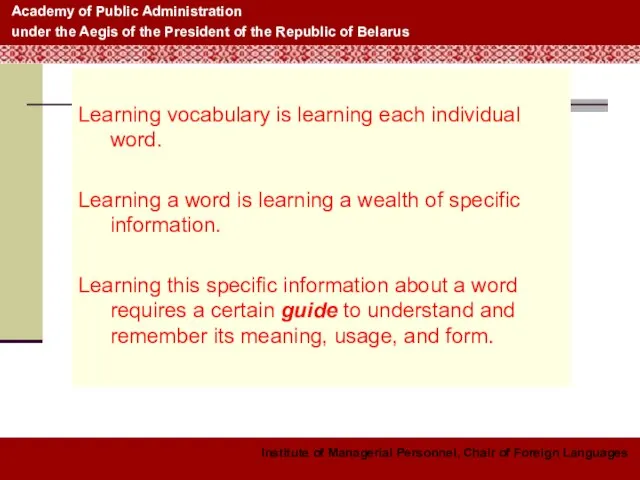
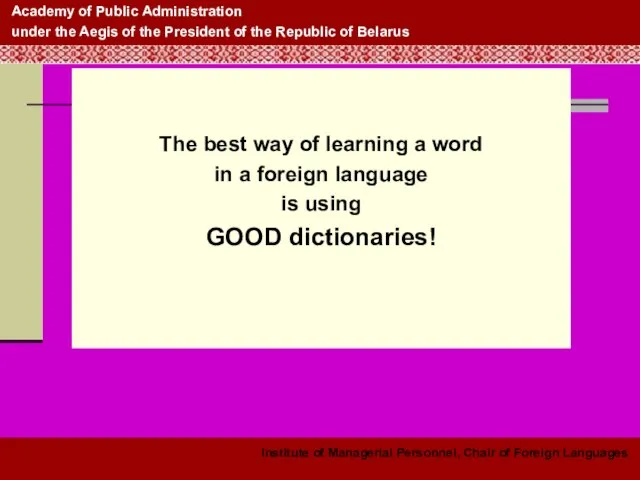
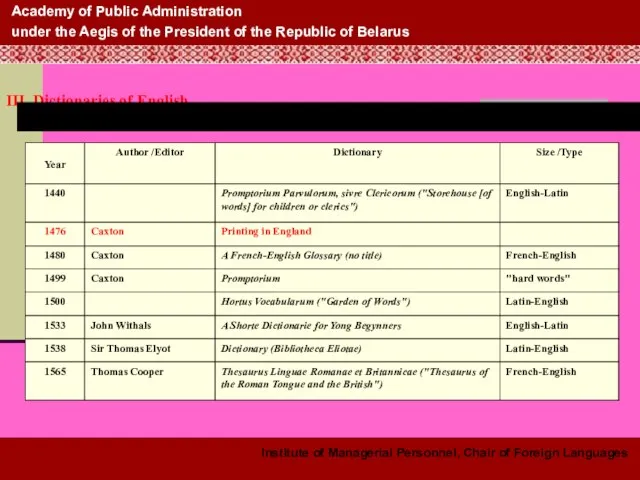
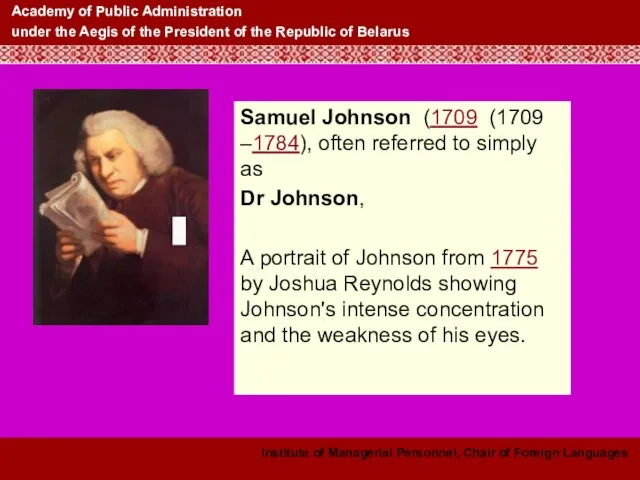
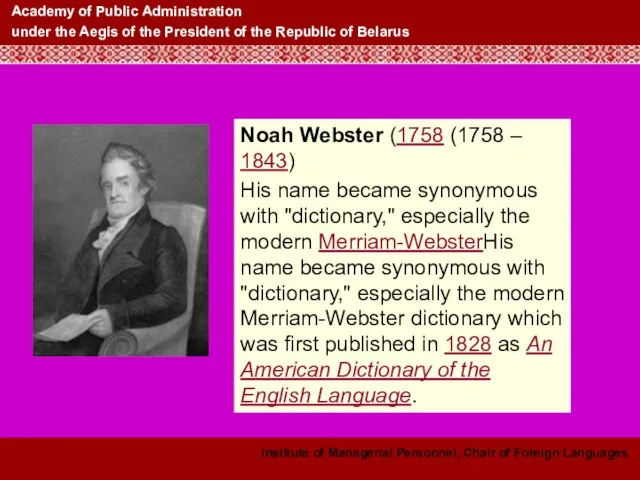
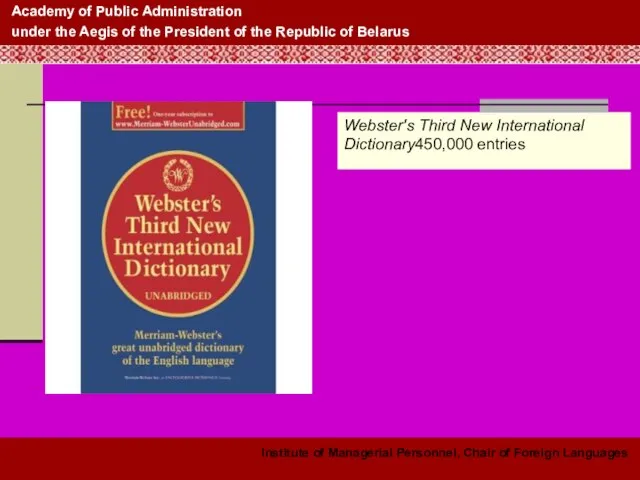
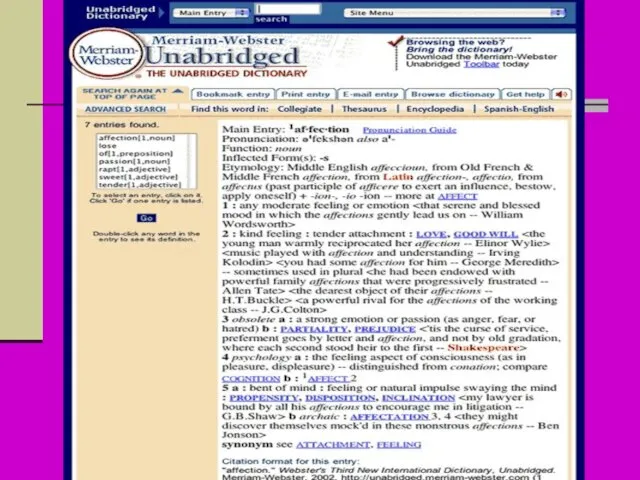

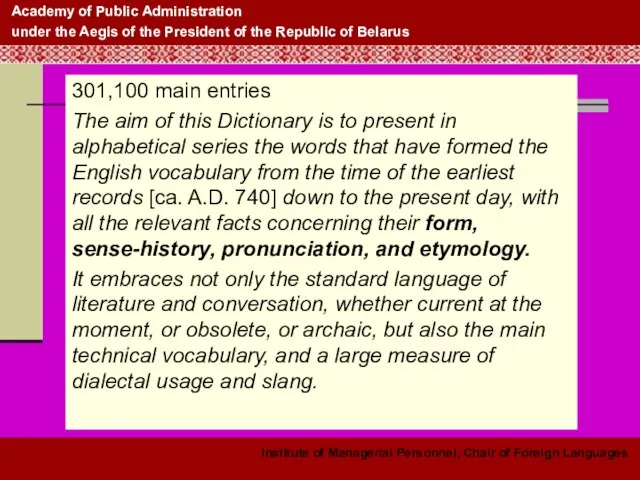
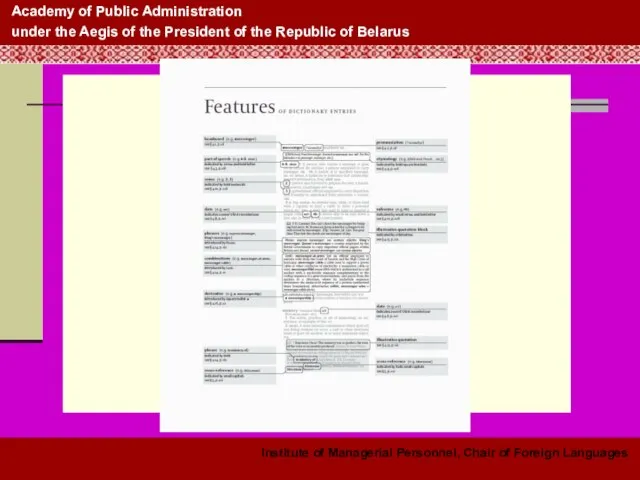
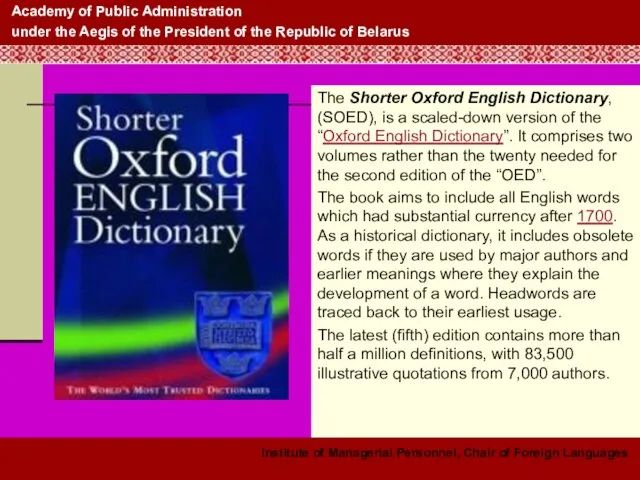
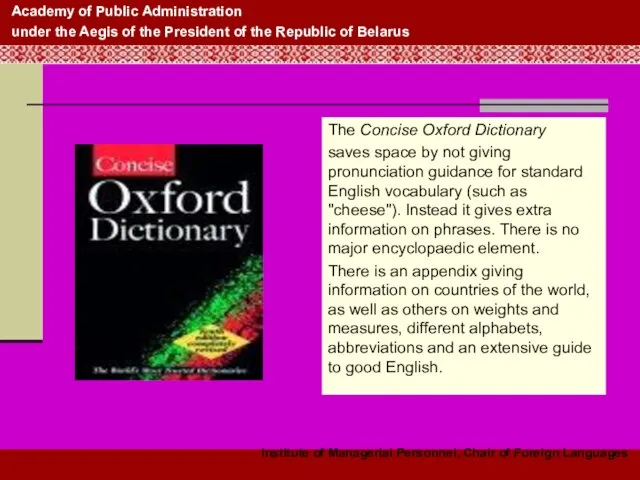
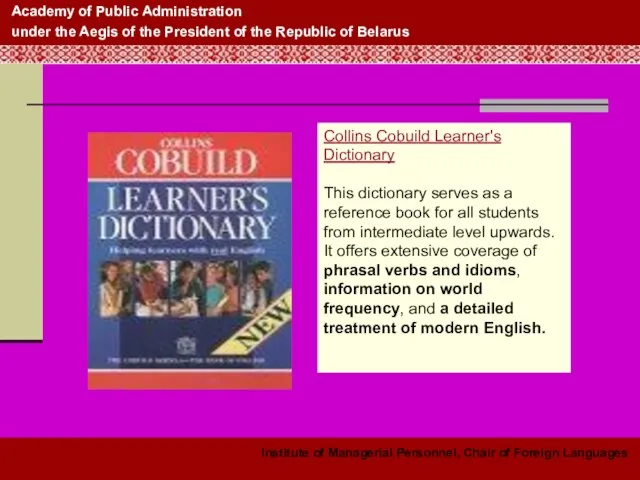
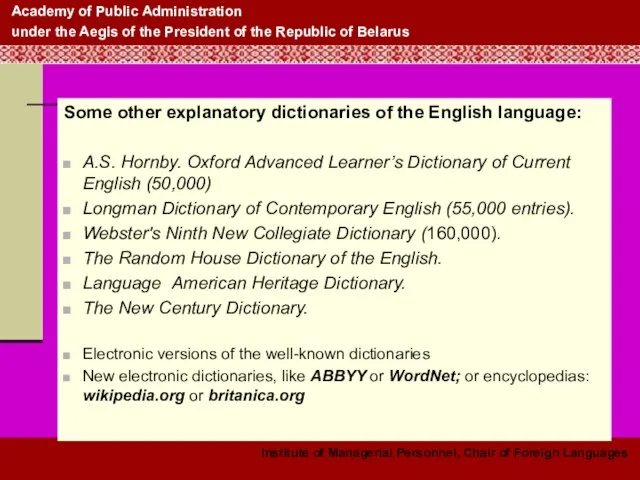
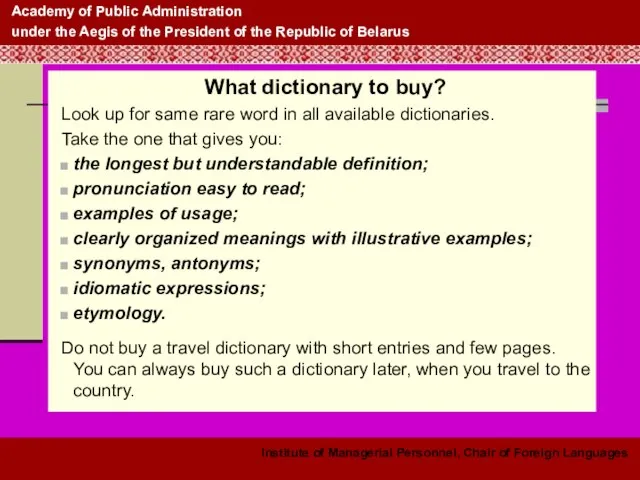
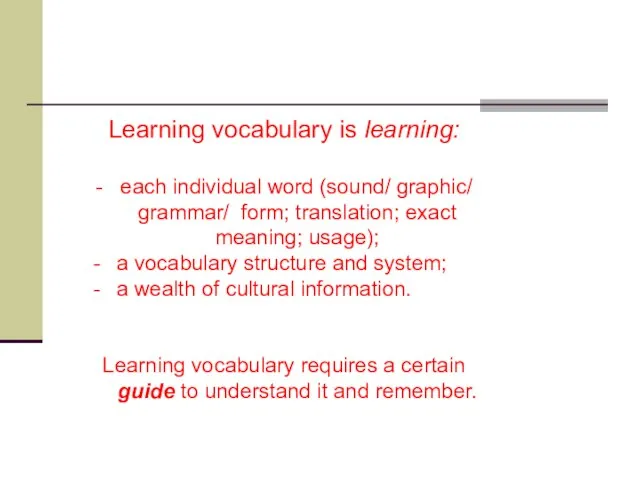
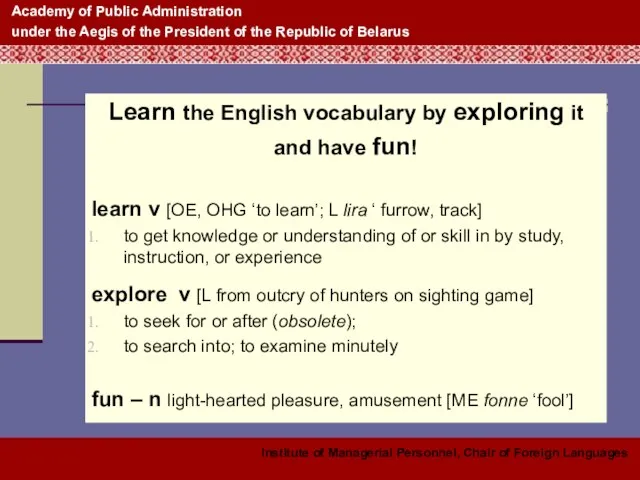
 Особенности истории России. Место России в мировом историческом процессе
Особенности истории России. Место России в мировом историческом процессе Оппортунистические инфекции
Оппортунистические инфекции  Всемирный день борьбы со СПИДом
Всемирный день борьбы со СПИДом Доказательная медицина и стандарты медицинской деятельности
Доказательная медицина и стандарты медицинской деятельности Система счетов и двойная запись
Система счетов и двойная запись Презентация на тему Лепка из пластилина
Презентация на тему Лепка из пластилина  Ночевала тучка золотая
Ночевала тучка золотая Revision
Revision Материально-производственная деятельность человека.
Материально-производственная деятельность человека. Как помочь ребёнку быть внимательным.
Как помочь ребёнку быть внимательным. Защитники земли русской. Работы учеников
Защитники земли русской. Работы учеников Презентация на тему ПОЛИТИЧЕСКИЙ ПРОГНОЗ: сущность, научные основы и принципы
Презентация на тему ПОЛИТИЧЕСКИЙ ПРОГНОЗ: сущность, научные основы и принципы  Словообразование (6 класс)
Словообразование (6 класс) 1 сентября. Классный час «От пера до компьютера».
1 сентября. Классный час «От пера до компьютера». Грамматические особенности перевода арабских фильмов на русский язык
Грамматические особенности перевода арабских фильмов на русский язык 1.3.2 Логические элементы ЭВМ
1.3.2 Логические элементы ЭВМ HTML
HTML Психологический климат в трудовом коллективе
Психологический климат в трудовом коллективе НОУ СОШ Гармония
НОУ СОШ Гармония Китайско-конфуцианская цивилизация
Китайско-конфуцианская цивилизация Каракули. Упражнение 2
Каракули. Упражнение 2 Презентация на тему Треугольники 7 класс геометрия
Презентация на тему Треугольники 7 класс геометрия  Moral Crisis in south Africa
Moral Crisis in south Africa Промоагентство
Промоагентство Презентация на тему Проблема темперамента и характера
Презентация на тему Проблема темперамента и характера Мой творческий путь в прозе и стихах
Мой творческий путь в прозе и стихах ПРОГРАММА«ТРИ ШАГА К УНИКАЛЬНОМУ СЕРВИСУ»GLOBAL SOLUTIONS Ltd.
ПРОГРАММА«ТРИ ШАГА К УНИКАЛЬНОМУ СЕРВИСУ»GLOBAL SOLUTIONS Ltd. Политические режимы. Типы политических режимов
Политические режимы. Типы политических режимов